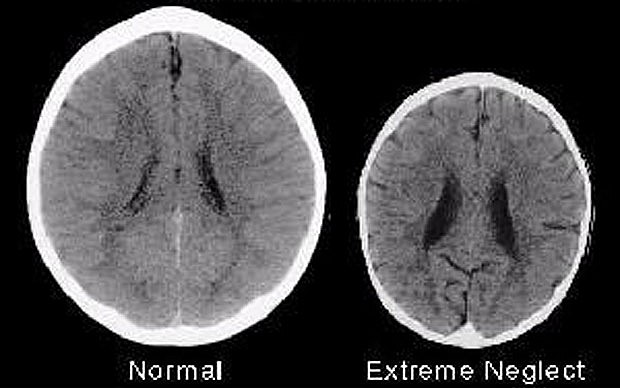Author: DynamicBrain Inc.
Publication: Monthly Newsletter
Published Date: January 29, 2013
Did you know that learning to tango improves cognition, balance, and multi-tasking? The complex series of dance steps, rhythm, and coordination with a partner work many brain areas simultaneously, and the benefits translate to activities off the dance floor. So it's fun to do, good for your body and good for your brain! A great all-in-one activity to consider for 2013.
Please share our newsletters if you find them beneficial (sign-up link at the bottom of this page). Public awareness is the key to healthy living and a fit mind, in a fit body. If you have any questions, please don't hesitate to ask, we are here to help!

Kind Regards,
Frieda Fanni
DynamicBrain Inc.
President
|
 |
 Dramatic Brain Size Difference in Two Children; Why?
Dramatic Brain Size Difference in Two Children; Why?
Both images belong to three-year-olds, but why is one so much bigger? Because one was loved by its parents and the other neglected - a fact that has dramatic implications!
Read more.
A Better Brain Implant
A thin, flexible electrode developed at the University of Michigan is 10 times smaller than the nearest competition and could make long-term measurements of neural activity practical at last.
Learn more.
Neuroscience Explains Why Wall Street Needs More Women
John Coates believes that the financial crisis was created, to some degree, by people's body chemistry. Would having more women on Wall Street and in the City help? Lets listen to John.
Find out why.
 The Top 3 Brain Foods of 2013
The Top 3 Brain Foods of 2013
Odds are you're missing some crucial ingredients for feeling your best. Most of us are. For the first time in the history of the world we are both overfed and undernourished.
Read here.
 Recovering From Autism Possible, Study Suggests
Recovering From Autism Possible, Study Suggests
The National Institutes of Health-funded study included children, teens, and young adults who received a diagnosis of autism early in life but moved off the autism spectrum as they grew older.
Read more.
Hearing loss accelerates brain function decline in older adults
Older adults with hearing loss are more likely to develop problems thinking and remembering than older adults whose hearing is normal, according to a new study by hearing experts at Johns Hopkins.
Read here.
 Why Do We Blink So Much?
Why Do We Blink So Much?
Scientists have shown that the average person blinks 15-20 times per minute. New research suggests that blinking provides mental rest.
Read more.
Book of the Month, Recommended by Dr. Michael Merzenich
Brain on Fire: My Month of Madness (2012)
Susannah Cahalan
Recent college graduate Susannah Cahalan was on the brink of starting her adult life as a reporter-until one day, she woke up in a hospital room after a month-long stay, with no memory of what had happened or why she was there. As she slid deeper into madness and catatonia, doctors failed to find a diagnosis until neurologist Souhel Najjar figured out the medical mystery and saved her life and her mind. Brain on Fire is a compelling, sometimes heart-stopping read from a promising young author.
SUBSCRIBE if you have received this newsletter indirectly.